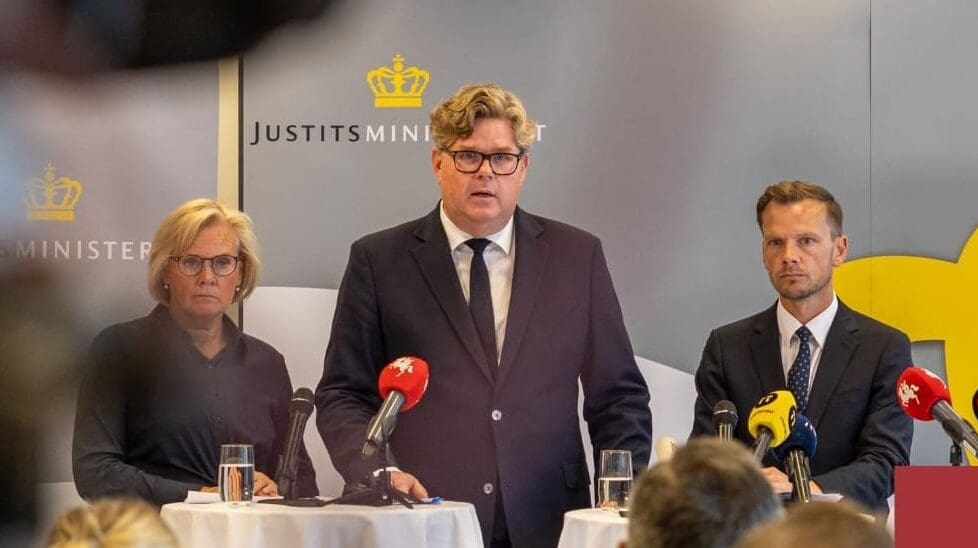
Norway’s Justice Minister Emilie Enger Mehl, Sweden’s Justice Minister Gunnar Strömmer, and Denmarks Justice Minister Peter Hummelgaard.
Photo:@Justitiedep on X, 21 August 2024
Nordic countries are stepping up their regional cooperation to fight Sweden’s increasingly international organized crime gangs after a surge of incidents in neighboring Norway and Denmark, justice ministers of Stockholm, Copenhagen, and Oslo announced during their joint press conference on Wednesday, August 21st.
These efforts will include “joint operations and joint patrolling,” primarily in Sweden and at the request of the Swedish police, Norwegian Justice Minister Emilie Enger Mehl told the media in the Danish capital.
Norway, a non-EU country but a member of the Schengen area, has been wanting to ramp up regional cooperation since it has been discovered recently that “Swedish” migrant gangs are active in every region of the country, with a steadily increasing prevalence of violent crime.
Apart from police officers, Norway, Denmark, and Finland also send criminal investigators to Sweden to facilitate knowledge exchange across the border and learn as much as they can about the nature of the problem. The Nordic anti-gang police hub is being set up in Stockholm, where Finnish and Norwegian officers are already stationed, and will be joined by their Danish colleagues in a few weeks.
Vid ett möte i Köpenhamn i dag enades Sveriges och Danmarks justitieministrar och rikspolischefer om ett antal ambitionshöjande åtgärder för att intensifiera det gemensamma arbetet mot den gränsöverskridande organiserade brottsligheten. 🇸🇪🇩🇰 Läs mer här: https://t.co/4zlu5BYdlu pic.twitter.com/0at8I5hQaU
— Justitiedepartementet (@Justitiedep) August 21, 2024
The operations would not only focus on gang activity but also on “digital channels [that] have been used to recruit young people,” the Swedish minister Gunnar Strömmer stressed, highlighting that 25 of recent cross-border incidents involved Swedish youths hired by Danish criminals to do the riskier tasks, like hit jobs on rival gangs.
The latest of such incidents—a bomb attack in downtown Copenhagen, carried out by two from Sweden—prompted Denmark to contemplate reintroducing permanent border checks on the famous Øresund Bridge which connects the capital with the gang-ridden city of Malmö in Southern Sweden.
Although Sweden’s gang problem is measurably spreading across its borders, the problem is nowhere as severe in the neighboring countries as it is within. Last year Sweden registered over 350 successful or thwarted bombings and 363 shooting incidents (including 53 fatalities and 109 woundings)—the highest numbers in all of Europe, in a country that once used to have the least amount of firearm crime, per capita.
In contrast, the other three Nordic countries registered only six fatal shootings combined in 2023, but they want to stop the problem before it spirals out of control. “The reality right now is that not only Denmark but large parts of the Nordic countries are feeling the consequences of Sweden’s long-standing failed immigration and legal policies, and we take that extremely seriously,” Danish Justice Minister Peter Hummelgaard said last week.
Of course, not just the neighbors, but Sweden also knows that it was their extremely lenient asylum policy that led to the situation. That is why the country’s center-right government set out to fundamentally overhaul the system by taking away most of the primary incentives attracting economic migrants.
The new policies appear to be successful: in less than two years Sweden has reached ‘net emigration’ for the first time in half a century, as more Middle Eastern migrants left the country this year than arrived—although later it was revealed that spectacular numbers may have been the result of a technical error at the population registry.
